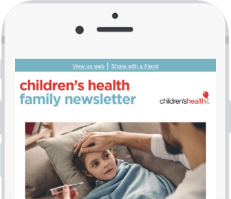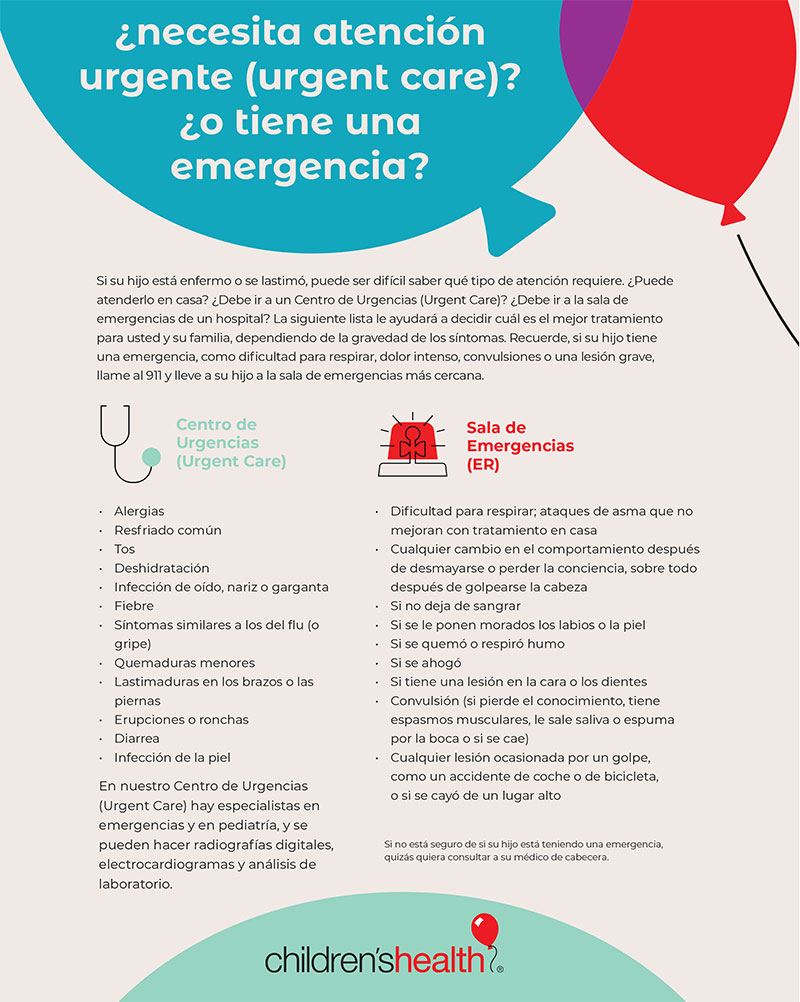If your child is sick or hurt, it is important to seek the right level of care to meet their needs. Depending on their condition, you may need to take your child to an emergency room or urgent care facility. But as a parent, how do you know which is best? We're here to help you make the correct choice.
Selecting the right level of care can:
- Allow them to be treated as quickly as possible
- Provide your child with the appropriate level of care
- Be more cost effective
What is the difference between urgent care and emergency care?
Urgent cares treat patients with injuries and illnesses that need quick medical attention but aren’t experiencing a life-threatening medical emergency. Urgent cares often treat illnesses like cold and flu symptoms and minor injuries. They typically offer a range of services such as x-rays, splints, stitches and treatment for common illnesses.
The emergency department handles serious and often life-threatening medical emergencies such as traumatic injuries and severe bleeding. ERs typically offer a broader array of services such as surgery, advanced imaging tests and intensive care.
When should I take my child to the emergency room?
Emergency rooms are designed to provide fast, lifesaving care. Many parents wonder what is considered an emergency for kids. While your child's condition could be urgent in nature, it may not always meet the medical criteria for an emergency room visit. Here are signs you should go immediately to the ER or call 911:
- Your child has a life-threatening illness or injury (see list below)
- Your child's symptoms come on suddenly and fast
- You think your child may need rapid or advanced treatment, like surgery
Here are some of the top reasons to take a child to the ER or call 911:
- Trouble breathing, including asthma that is not improving with home treatments
- Any change in behavior following loss of consciousness, especially after a head injury
- Bleeding you can't stop
- Blue or purple skin or lips
- Burns or smoke inhalation
- Choking
- Facial or dental injuries
- Seizures (losing consciousness, muscle spasms, drooling or foaming at mouth, falling)
- Any impact injuries, such as from a car or bicycle accident, or falls from heights
Emergency rooms are open 24 hours a day, 7 days a week. Children's Health has the only pediatric Level I ER/Trauma Program in North Texas and all care team members are specially trained in treating children. Learn more about our ER locations and why it is important to choose a pediatric emergency department
When should I take my child to urgent care?
It is usually best to take your child to an urgent care center if:
- Your child has a non-life-threatening condition (see the list below)
- Your child's symptoms are gradual, not sudden
- Your child's primary care physician is not available, such as at night or on the weekend
Here are some common reasons to take your child to urgent care:
- Allergies
- Common colds
- Coughs
- Dehydration
- Ear, nose and throat infections
- Fevers
- Flu-like symptoms
- Minor burns
- Arm or leg injuries
- Rashes
- Diarrhea
- Skin infections
While most urgent cares offer extended hours in the evenings, they are typically not open 24 hours a day. Before you take your child to an urgent care location, check to make sure they see children of all ages. Children’s Health PM Pediatric Urgent Care offers care 365 days a year for non-life-threatening conditions in newborn babies through college-age patients.
Can I take my infant to urgent care?
Some, but not all urgent cares treat infants. Check with the urgent care ahead of time to see if there is a minimum age for the patients they treat. All Children’s Health PM Pediatric Urgent Care locations provide care for newborns and infants.
Non-urgent care options for your child:
Primary care and virtual visit
When should you see your pediatrician?
Primary care and pediatrician offices treat most common illnesses in children. When your child is sick, their pediatrician is one of the best people to provide care, as they will know your child’s unique medical history. They can also provide ongoing care and treatment for chronic conditions.
If you have questions about your child’s symptoms, call your pediatrician office for guidance. They can help advise you if you should come in for an appointment, provide care at home or if more urgent care is needed. If your child does not have a pediatrician, visit Children’s Health Primary Care to view locations and providers.
When can you use a virtual visit for a child?
Virtual visits allow you to see a medical provider from virtually anywhere using a video visit on your smartphone, tablet or computer. A virtual visit is an easily accessible option when you need quick medical care for your child or you may not be able to access your child’s primary care provider.
Many common health conditions in children can be treated using virtual visits, including:
- Allergies
- Common colds
- Ear, nose and throat infections
- Flu-like symptoms
- Mild burns
- Minor cuts
- Rashes
- Sinusitis
- Skin infections
Learn more about Virtual Visit, brought to you by Children's Health Virtual Care, including how it works and frequently asked questions.
Learn more
With two pediatric emergency rooms, pediatric urgent care locations around the metroplex, high-quality virtual care and expert pediatricians, Children’s Health is nearby and ready to help when you need it most.

Thank you!
You are now subscribed to the Children's Health Family Newsletter.
Children's Health will not sell, share or rent your information to third parties. Please read our privacy policy.
